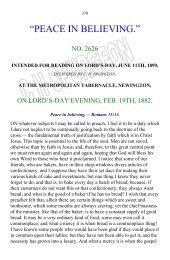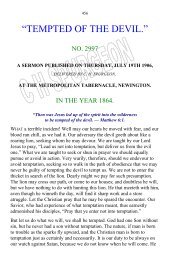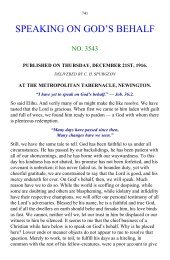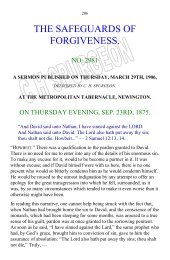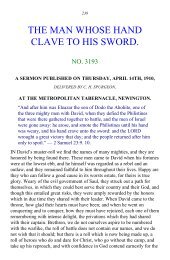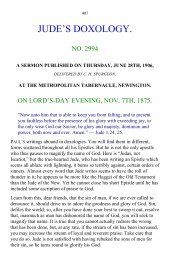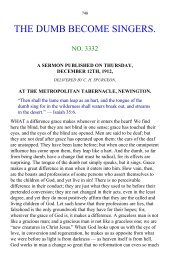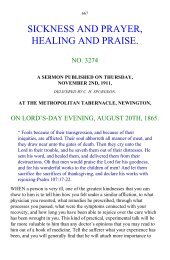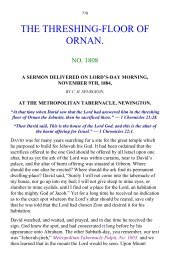THE LAST WORDS OF CHRIST ON THE CROSS. - APIBS Home
THE LAST WORDS OF CHRIST ON THE CROSS. - APIBS Home
THE LAST WORDS OF CHRIST ON THE CROSS. - APIBS Home
You also want an ePaper? Increase the reach of your titles
YUMPU automatically turns print PDFs into web optimized ePapers that Google loves.
660<br />
thought that God was his Father. It was because he said that God was his<br />
Father that they put him to death, yet he still stood to it even in his dying<br />
hour, and said, “Father, into thy hands I commend my spirit.”<br />
What a blessed thing it is for us also, my brethren, to die conscious that we<br />
are sons of God! Oh, how sweet, in life and in death, to feel in our soul the<br />
spirit of adoption whereby we cry, “Abba, Father”! In such a case as<br />
that,—<br />
It is not death to die.<br />
Quoting the Savior’s words, “It is finished,” and relying upon his Father<br />
and our Father, we may go even into the jaws of death without the<br />
“quivering lips” of watch we sang just now. Joyful, with all the strength we<br />
have, our lips may confidently sing, challenging death and the grave to<br />
silence our ever-rising and swelling music. O my Father, my Father, if I am<br />
in thy hands, I may die without fear!<br />
There is another thought, however, which is perhaps the chief one of all.<br />
From this passage, we learn that our Divine Lord cheerfully rendered up<br />
his soul to his Father when the time lund come for him to die: “Father, into<br />
thy hands I commend my spirit.” None of us can, with strict propriety, use<br />
these words. When we come to die, we may perhaps utter them, and God<br />
will accept them; these were the very death-words of Polycarp, and<br />
Bernard, and Luther, and Melancthon, and Jerome of Prague, and John<br />
Huss, and an almost endless list of saints: “Into thy hands I commit my<br />
spirit.” The Old Testament rendering of the passage, or else our Lord’s<br />
version of it, has been turned into a Latin prayer, and commonly used<br />
among Romanists almost as a charm; they have repeated the Latin words<br />
when dying, or, if they were unable to do so, the priest repeated the words<br />
for them, attaching a sort of magical power to that particular formula. But,<br />
in the sense in which our Savior uttered these words, we cannot any of us<br />
fully use them. We can commit or commend our spirit to God; but yet,<br />
brethren, remember that, unless the Lord comes first, we must die; and<br />
dying is not an act on our part. We have to be passive in the process,<br />
because it is no longer in our power to retain our life. I suppose that, if a<br />
man could have such control of his life, it might be questionable when he<br />
should surrender it, because suicide is a crime, and no man can be required<br />
to kill himself. God does not demand such action as that at any man’s hand;<br />
and, in a certain sense, that is what would happen whenever a man yielded<br />
himself to death. But there was no necessity for our blessed Lord and



